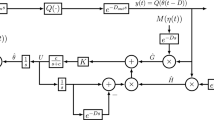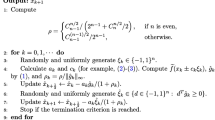Abstract
In this paper, we propose a stochastic approximation algorithm for optimization of functions based on an adaptive extremum seeking method. The essence of this method is to approximate the gradient direction by introduction of a probing sequence, that is added to approximations and subsequently demodulated using an adaptive gain. Assuming that the probing and the demodulation signals are martingale difference sequences with adaptive diminishing gains, it is proved that the approximations converge almost surely to the optimizing value, under mild constraints on the measurement disturbance, and without assuming a priori boundedness of the approximation sequence. The measurement disturbance can contain a stochastic component, as well as a mean-square bounded deterministic component. The stochastic component can be nonstationary colored noise or a state-dependent random sequence.


Similar content being viewed by others
References
Tan, Y., Moase, W., Manzie, C., Nešić, D., Mareels, I.: Extremum seeking from 1922 to 2010. In: Proceedings of 29th Chinese Control Conference, pp. 14–26 (2010)
Choi, J.Y., Krstić, M., Ariyur, K.B., Lee, J.S.: Extremum seeking control for discrete-time systems. IEEE Trans. Autom. Control 47, 318–323 (2002)
Ghaffari, A., Krstić, M., Nešić, D.: Multivariable Newton-based extremum seeking. Automatica 48, 1759–1767 (2012)
Stanković, M.S., Stipanović, D.M.: Extremum seeking under stochastic noise and applications to mobile sensors. Automatica 46, 1243–1251 (2010)
Manzie, C., Krstić, M.: Extremum seeking with stochastic perturbations. IEEE Trans. Autom. Control 54, 580–585 (2009)
Liu, S.J., Krstić, M.: Stochastic averaging in discrete time and its applications to extremum seeking. IEEE Trans. Autom. Control 61, 90–102 (2015)
Radenković, M.S., Altman, T.: Stochastic adaptive stabilization via extremum seeking in case of unknown control directions. IEEE Trans. Autom. Control 61(11), 3681–3686 (2016)
Kiefer, J., Wolfowitz, J.: Stochastic estimation of the maximum of a regression function. Ann. Math. Stat. 23(3), 462–466 (1952)
Kushner, H.J., Clark, D.S.: Stochastic Approximation Methods for Constrained and Unconstrained Systems. Applied Mathematical Sciences, vol. 26. Springer, Berlin (1978)
Chin, D.C.: Comparative study of stochastic algorithms for system optimization based on gradient approximations. IEEE Trans. Syst. Man Cybern. Part B Cybern. 27(2), 244–249 (1997)
Spall, J.C.: Multivariate stochastic approximation using a simultaneous perturbation gradient approximation. IEEE Trans. Autom. Control 37, 332–341 (1992)
Spall, J.C.: A one-measurement form of simultaneous perturbation stochastic approximation. Automatica 33, 109–112 (1997)
Dvoretsky, A.: On stochastic approximation. In: Proceedings of 3rd Berkeley Symposium on Mathematical Statistics and Probability, vol. 1, pp. 39–56 (1956)
Nevelson, M.B., Hasminsky, R.Z.: Stochastic Approximation and Recursive Estimation. AMS Providence, Rhode Island (1973)
Wada, T., Fujisaki, Y.: Stopping rules for optimization algorithms based on stochastic approximation. J. Optim. Theory Appl. 169(2), 568–586 (2016)
Granichin, O.N.: Randomized algorithms for stochastic approximation under arbitrary disturbances. Autom. Remote Control 63(2), 209–219 (2002)
Lai, T.L., Wei, C.Z.: Least square estimates in stochastic regression models with applications to identification and control of dynamic systems. Ann. Stat. 10, 154–166 (1982)
Spall, J.C.: Adaptive stochastic approximation by the simultaneous perturbation method. IEEE Trans. Autom. Control 45, 1839–1853 (2000)
Prashanth, L., Bhatnagar, S., Fu, M., Marcus, S.: Adaptive system optimization using random directions stochastic approximation. IEEE Trans. Autom. Control 62(5), 2223–2238 (2017)
Kumar, P.R., Varaiya, P.: Stochastic Systems: Estimation, Identification and Adaptive Control. Prentice-Hall, Inc., Upper Saddle River (1986)
Acknowledgements
Funding of the author Miloš S. Stanković was provided by Seventh Framework Programme (Grant No. PCIG12-GA-2012-334098).
Author information
Authors and Affiliations
Corresponding author
Additional information
Communicated by Jyh-Horng Chou.
Rights and permissions
About this article
Cite this article
Radenković, M.S., Stanković, M.S. & Stanković, S.S. On Stochastic Extremum Seeking via Adaptive Perturbation–Demodulation Loop. J Optim Theory Appl 179, 1008–1024 (2018). https://doi.org/10.1007/s10957-018-1380-8
Received:
Accepted:
Published:
Issue Date:
DOI: https://doi.org/10.1007/s10957-018-1380-8




